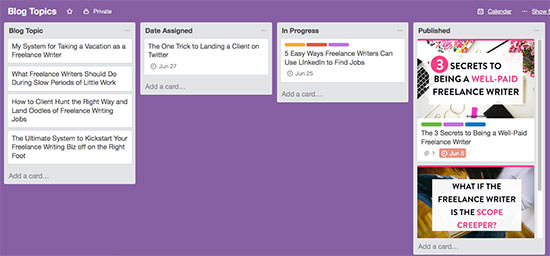I see it all the time.
New freelance writers who are struggling to find a new client and can’t figure out why they haven’t landed a gig yet. They feel they are doing everything right.
From checking the job boards daily to sending out their pitch to even making sure to send relevant samples, but no response with a job offer.

If you’re a new freelance writer you’re probably wanting to know why you can’t freakin’ find a client. It’s aggravating to say the least.
Well, I’ve been a freelance writer for three years now – wow! – and the one thing I’ve learned is that I sure made a lot of mistakes before I really became successful. My first year was a huge learning curve.
But, what’s great is that you don’t have to make the same mistakes I did. You can learn from mine and use that knowledge to get out there and make a living from writing.
If this is your first year as a new freelance writer, learn to dodge these common mistakes.
Check out my Youtube video on my embarrassing mistakes I’ve made!
1. You Never Follow Up

Let me ask you this:
What’s your pitching process?
I mean, do you have a plan for what happens after you send your pitch? Or, do you just continue sending pitch after pitch waiting for someone to contact you with a gig?
For the longest time, I had no follow up strategy after I sent my pitches. I thought answering a job ad was all that I needed to do.
Boy was I wrong! Did you know that the likelihood of landing a gig increases by simply following up on a pitch you sent out?
If you don’t know, when business owners or entrepreneurs draft up a job ad they are usually shocked by the amount of applicants that applied. There could be hundreds of hopeful freelance writers wanting that gig.
These business owners need to weed through countless pitches and it can take them days to do this. So when you send your follow up email, you may just catch the business owner when they’re knee-deep into reading pitches. When they see your follow up email, it conveniently directs them to you and your pitch.
So after you send a pitch, you need to do more than what you are doing!
Wait a week or so and follow up. Ask if they have already found a content writer for that gig and if they haven’t, to mention that you’re still available.
2. Your Pitch Isn’t Strong
On the subject of pitches:
The number one reason you’re probably not landing that gig is because you don’t have a strong pitch.
For example, maybe when you describe your experience you use phrases like, “I’m new,” “I’m still learning,” or “I’ve only been a freelance writer for a few months.”
Letting a prospect know that you’re new doesn’t make them want to work with you (unless you have a stellar portfolio).
Remember that you are not working FOR your clients; you’re working WITH your clients. And this means you need to convey your expert knowledge in your service – even if this is your sixth week as a freelance writer.
That’s why in my freelance writing course, I opened up my pitch archive and gave students a look at my first pitch and several of my current winning pitches. And, I also made sure to supply my students with the Pitching Handbook to help them develop strong and high converting pitches.
3. You’re Overbearing

Ah, this was me as a budding new freelance writer.
I was new and reading blog post after blog post from some amazing freelance writers and one thing I learned from some of them is to make sure to ask the right questions.
So I made sure that I did. I ended up asking a ton of questions to suss out a potential gig. And you know what happened? I never landed the stinkin’ gig.
Go figure.
Now I know better to not bombard prospects with silly questions like “what’s more important to you, quality or speed?”
I learned to ask the most important questions like word count, frequency and payment schedule instead.
Being overbearing for many entrepreneurs and small business owners is a red flag that you’re not flexible or easy-going as a freelance writer.
So, before you email your client a gazillion emails or bother them on the weekends, think about streamlining your emails and sending one email with a one or two questions at a time.
4. You Make Too Many Grammar and Formatting Errors
Let me just raise my hand on this one – I’m notorious for making grammar errors. Just ask my copyeditor. I spell names wrong ALL.THE.TIME.
And sure there are editing tools like Hemingway or Grammarly, but they don’t catch everything.
But, if there’s one thing you gotta do, it’s making sure your pitch has no grammar errors. Your pitch is the first introduction to a potential client of you and your services, so read your pitch carefully and run it through some editing software.
If possible, have another freelancer or family member read your pitch for errors.
One other thing to pay attention to is the formatting of your pitch. Francesca Nicasio of Be a Freelance Writer, failed to land a gig because she didn’t properly format her pitch.
I once made the mistake of sending an introduction email without properly formatting it and, boy, was it an embarrassing experience. Not only did I fail to land the gig, but the CEO of the company got back to me and pointed out certain parts of the email were in a different font. This made it obvious that I copied and pasted some of the things I wrote.
I know a great productivity hack is to create a standard pitching template so that you can cut and paste the necessary parts and mass send multiple pitches.
But, just be careful that you fix any formatting problems like different fonts, colors, and names before sending off your pitch email.
5. You Only Hustle When Business is Slow
Okay.
I’m totally guilty of this. After a while some freelance writers become complacent. They have enough work to pay the bills and live comfortably and the work they have is enjoyable and fun.
But, this is when it can get dangerous. This is when you become complacent. Lizzie Davey of Wanderful World did a roundup post a while back asking freelancers their number one tip to a successful freelance launch. I said,
As a freelancer, you never want to become complacent. You may have a full schedule of client work and feel on top of the world, but you should never assume this will last.
Ask any experienced freelancer and they can tell you, it’s entirely possible to lose many clients over a short period of time, and then you’re back at square one. So, get out there and always be hustling.
Boy, I should take my advice eh? Summers can be a slow time for freelancers and although it’s not entirely slow for me, it is a bit. I am writing less and many of my clients are holding onto my work until the fall – when traffic picks up – to publish my posts.
So, when my work isn’t out there online, I get less inquiries for my services. And even though I’m two years in, it doesn’t mean I stop pitching.
It doesn’t mean I no longer hustle.
And it doesn’t mean the clients I have now will be the clients I have six months from now or a year from now.
So learn from me, when your business is booming, still guest post to get your name out there and still check the job boards or work on your cold pitches to always ensure that you have continual work.
6. You Don’t Have a Project Management System

Do you have a project management system for all your client work and pitches you send out?
I’m learning that the more blogs I manage and the more clients I have, the more I need to really streamline my work. And the best way to do that is with Google sheets or a tool like Trello.
I actually use both – Google sheets for my client work, pitches and finances – and Trello for my content schedule for my blogs.
My Google sheet lays out all the steps that a project goes through from inception to submission. You can click on my project management system to see it bigger.

After my posts are written, it goes through several steps such as a first edit, a Grammarly edit and a peer edit before it’s ready for the client.
The sheet is also color-coded, meaning that projects that are in progress are yellow and projects that are finished are blue. Projects in red are those that haven’t been paid for (i.e I sent the invoice and am waiting to be paid).
I keep tabs of every step since I am currently working with over 10 clients and I don’t want to make any mistakes.
I’ve been using this for over a year and it’s totally helpful in showing me a snapshot of what’s going on in my freelance writing business.
I also use Trello for my content schedule for both this blog and my Twins Mommy blog.

Using Trello helps me create my content schedule and helps me stay on top of my content.
7. You Don’t Have a Blog
I get emails all the time from new writers asking me if it’s necessary to have a blog. And you know what I tell them?
Of course you should have a blog! It’s an instant way to grow your portfolio and get some samples. Prospects typically like when your samples are live links and aren’t something like a shareable Google doc or PDF.
And having a blog can help you with this. It’s also an easy way to actually land your first freelance writing client.
So, get out there and start a blog.
8. You’re Too Confident
Oh no, I said it!
Being confident can totally rock your freelance biz. There are just too many new freelance writers that aren’t confident yet, so having any amount of confidence can help you land a freelance writing job. Well, not any amount – having too much confidence will get you nowhere.
If you feel entitled that you deserve a set rate or that because you have a degree in journalism you automatically should land that gig, you’re going to have a tough time getting ANY paid writing work.
And just because you’re a great writer, doesn’t mean you’ll be a successful one.
Being too arrogant doesn’t rub off the right way to potential clients, to other freelancers and to your current clients either.
So, before you demand $.25/word without a portfolio to show for it, consider paying your dues first.

9. Your Niche is Too Broad
Sometimes going bigger isn’t better.
If your niche is too broad – for example, gardening instead of hydroponics – you’ll have a harder time landing high-paying clients.
You know why? Because those clients want experts in their niche.
Content clients seek writers that are experienced in one industry or niche. When I moved from writing about natural health and parenting and started writing in the digital marketing niche, my per word rate went from $.05/word to over $.15/word and now it’s closer to $.30/word.
The more experience you can give to your client, the more you can charge for your writing.
10. You Don’t Have a Writer Website
You want to get paid to write online right?
Well, then you need an online home base and a writer website is just that.
Your professional writer website is what prospective clients see after your pitch email. They click either on your samples or your website to get to know more about you.
So having a clean and polished website that’s free of ads, unnecessary images on the sidebar and has clean copy will help you land a client.
Most prospects come to me from my contact form on my writer website. So, I know prospects visit my writer website. That’s why I update my website frequently to represent what’s going on in my business right now.
What if having a writer website isn’t in your budget? Well it is possible to have a professional-looking free website, but it’s always recommended to have a self-hosted site since it’s more professional that way.
11. You’re Not Sure How to Use Social Media
With Snapchat and Instagram becoming popular, what’s a new freelance writer to do?
You’re just understanding how to use Twitter to land clients and now you hear you need to be on Pinterest and Facebook too?
Which social media platform should freelance writers be on? There is no right answer, but what I teach my students is to have a profile on at least two platforms:
These two platforms generated me thousands of dollars and many gigs. So don’t worry about having to be on Snapchat, Periscope, Youtube or Vine.
Start with Twitter and LinkedIn and later on you may want to look into starting a Facebook business page.
12. You’d Rather Work on Your Own Personal Projects Than Your Client Work
Okay.
I’m also guilty of this. Working on my own personal projects is a treat for me. During my first year, I didn’t have many personal projects, except for my freelance writing course.
But that quickly grew to taking over FreelancerFAQs and now starting Twins Mommy.
I’m also doing more webinars – yay! LOVE them – and I’m working hard to balance it all.
And this can be a slippery slope.
But, that’s why you have to remember your why. Why did you start freelancing writing in the first place? For me, it’s so that I can be home with my twins and still make a living.
I LOVE freelance writing. I really do. I write so much in a week – over 10,000 words – writing blog posts for this blog and Twins Mommy, writing content upgrades, newsletters, guest posts and my client work. But, I love it.
Sure, I might get a bit burned out, but that’s why I have a lot on my plate. That’s why I have Twins Mommy. I can focus on that platform for a bit, get re-energized and then come back to my client posts.
And you know what? Because I’m growing my other blog, I’m getting more freelance writing work. Clients are noticing my posts on that blog and requesting more work from me.
So, it really is a win-win, but for new freelance writers, it can be a challenge to pry yourself away from writing for yourself and, instead, write for your clients.
13. You Don’t Have Time to Learn New Skills
I know.
There is NO TIME to do anything!
I so, so, so get you. My twins are getting ready to drop their only nap in the day and this cuts my work hours almost in half. So, I’m sweating buckets right now 🙂
But, you’re a new writer. You should have some extra time, right? The best thing new writers should know – especially if they want to write for an online audience – is to learn how to use online tools.
Things like Trello, Skitch, Google Drive, or Evernote can help you structure your day and business.
What’s great is that if you become a student in my Writeto1k course, you have access to video training, where I show you how to use such tools.
These enhanced videos will help you manage your business and client work. Knowing how to properly format your post for your clients is important if you want recurring work.
Learning how to use Skitch or another tool for your client’s work adds more value to your work, which gives you leverage to raise your rates.
14. You Don’t Have a Plan to Take Your Biz to the Next Level
Do you have a five year plan for your freelance writing business? I didn’t when I first started.
Are you setting S.M.A.R.T. goals to take your biz to the next level? I didn’t for the first few months.
New freelance writers should really sit down and not only plan for launching your side hustle or getting to full time hustle, but also to plan out your goals.
Set a financial goal and a time frame. Think about a year from now and two years from now. Do you see yourself still as a freelance writer, or more of a product creator?
Do you see yourself only offering writing services or maybe other services such as website design, Pinterest marketing or coaching?
Before you jump into freelancing, think about your goals to grow your business.
Learn From My Mistakes
Well, I didn’t make all these 14 mistakes, but I’ve sure made a few of them. And you know what? I’m still a success and I’m still freelance writing.
So, even if you do make these mistakes, don’t think that you can’t ever get back on track. It just took me longer to reach my goals, but it doesn’t have to be like that for you.
Have you made any of these mistakes? Share your story in the comments!
Sign up to my free six-day email course and get even more actionable tips to help you succeed as a freelance writer.
If you’re ready to really earn a living from writing, you can get your step-by-step profitable freelance writing blueprint by joining Write Your Way to Your First $1k. It walks you through the exact action steps you need to take to land clients, tweak your website to increase conversions and get paid to write.





27 Comments